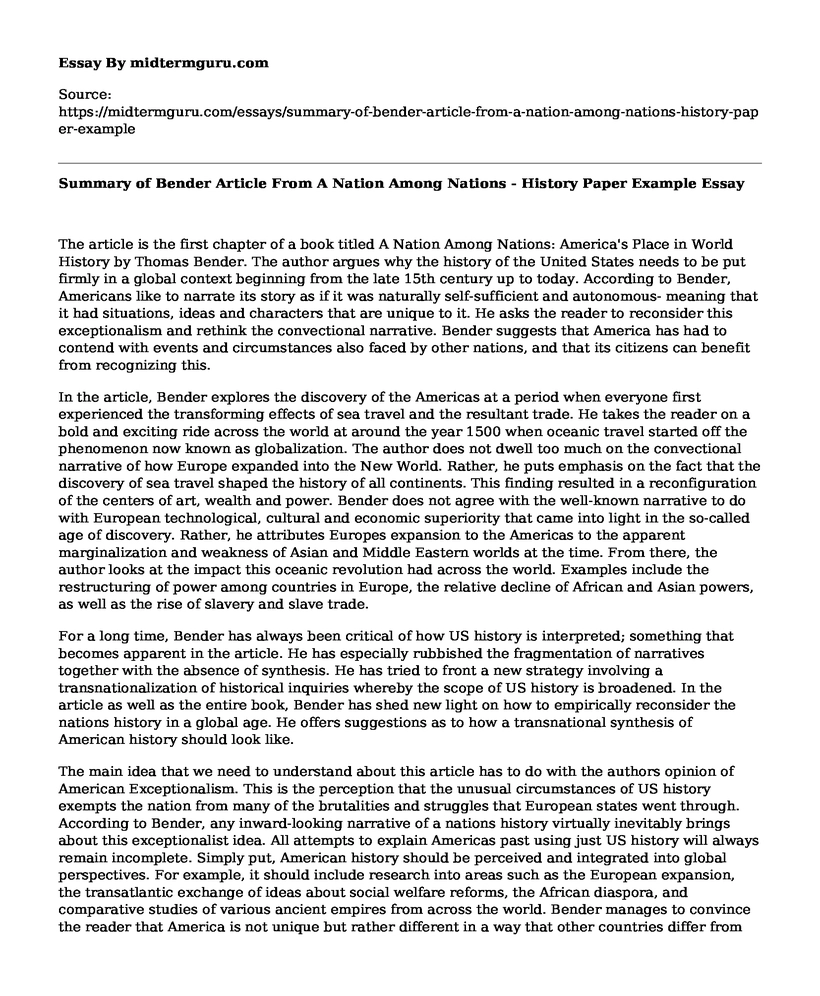The article is the first chapter of a book titled A Nation Among Nations: America's Place in World History by Thomas Bender. The author argues why the history of the United States needs to be put firmly in a global context beginning from the late 15th century up to today. According to Bender, Americans like to narrate its story as if it was naturally self-sufficient and autonomous- meaning that it had situations, ideas and characters that are unique to it. He asks the reader to reconsider this exceptionalism and rethink the convectional narrative. Bender suggests that America has had to contend with events and circumstances also faced by other nations, and that its citizens can benefit from recognizing this.
In the article, Bender explores the discovery of the Americas at a period when everyone first experienced the transforming effects of sea travel and the resultant trade. He takes the reader on a bold and exciting ride across the world at around the year 1500 when oceanic travel started off the phenomenon now known as globalization. The author does not dwell too much on the convectional narrative of how Europe expanded into the New World. Rather, he puts emphasis on the fact that the discovery of sea travel shaped the history of all continents. This finding resulted in a reconfiguration of the centers of art, wealth and power. Bender does not agree with the well-known narrative to do with European technological, cultural and economic superiority that came into light in the so-called age of discovery. Rather, he attributes Europes expansion to the Americas to the apparent marginalization and weakness of Asian and Middle Eastern worlds at the time. From there, the author looks at the impact this oceanic revolution had across the world. Examples include the restructuring of power among countries in Europe, the relative decline of African and Asian powers, as well as the rise of slavery and slave trade.
For a long time, Bender has always been critical of how US history is interpreted; something that becomes apparent in the article. He has especially rubbished the fragmentation of narratives together with the absence of synthesis. He has tried to front a new strategy involving a transnationalization of historical inquiries whereby the scope of US history is broadened. In the article as well as the entire book, Bender has shed new light on how to empirically reconsider the nations history in a global age. He offers suggestions as to how a transnational synthesis of American history should look like.
The main idea that we need to understand about this article has to do with the authors opinion of American Exceptionalism. This is the perception that the unusual circumstances of US history exempts the nation from many of the brutalities and struggles that European states went through. According to Bender, any inward-looking narrative of a nations history virtually inevitably brings about this exceptionalist idea. All attempts to explain Americas past using just US history will always remain incomplete. Simply put, American history should be perceived and integrated into global perspectives. For example, it should include research into areas such as the European expansion, the transatlantic exchange of ideas about social welfare reforms, the African diaspora, and comparative studies of various ancient empires from across the world. Bender manages to convince the reader that America is not unique but rather different in a way that other countries differ from one another.
Cite this page
Summary of Bender Article From A Nation Among Nations - History Paper Example. (2021, Jun 04). Retrieved from https://midtermguru.com/essays/summary-of-bender-article-from-a-nation-among-nations-history-paper-example
If you are the original author of this essay and no longer wish to have it published on the midtermguru.com website, please click below to request its removal:
- Essay on Art History: War and Its Consequences
- Essay Sample on Independence of America
- Paper Example on Causes of Russian Intervention in Ukraine
- Book Analysis Essay on Memoir of a Revolutionary Soldier
- Food Packaging: Ancient History to Modern Society - Research Paper
- Slavery: A Dark History, Unpunished and Romanticized - Essay Sample
- Stock Market Crash: Catalyst of the Great Depression - Essay Sample







